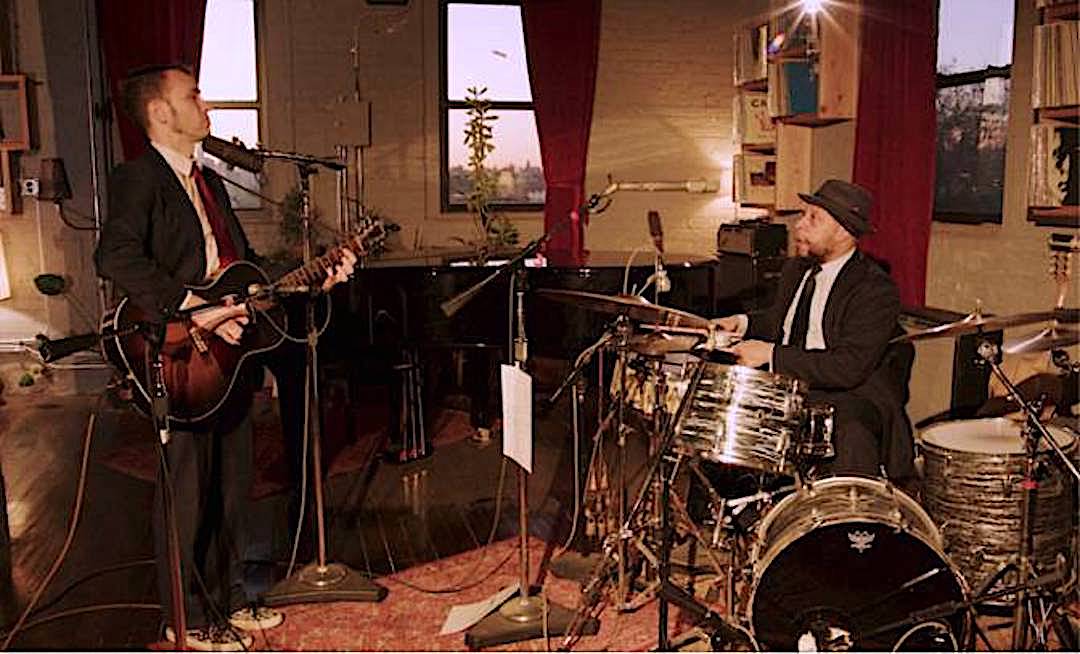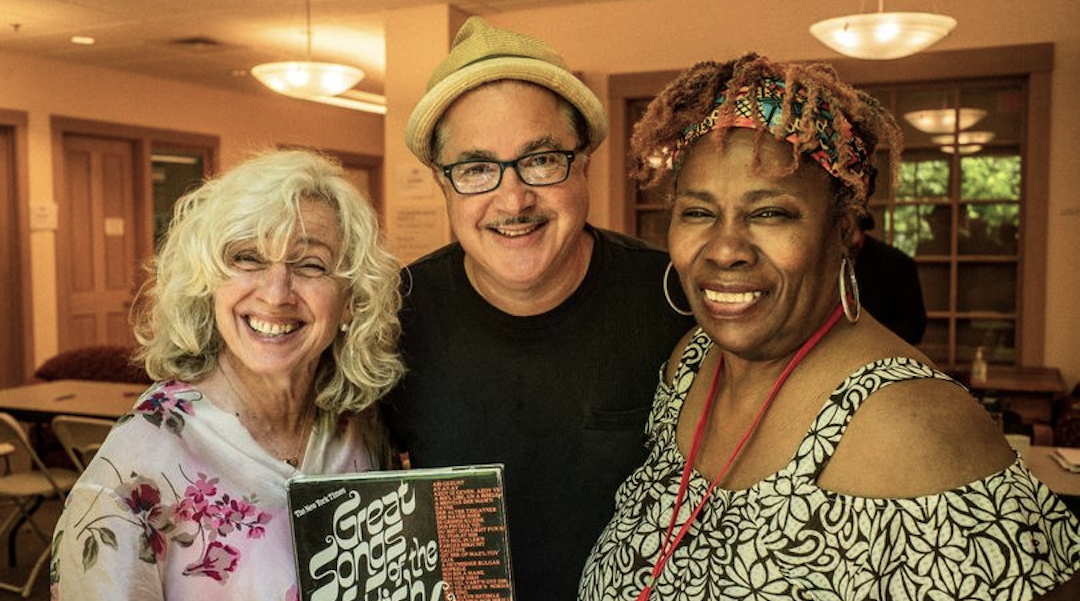(New York Jewish Week) — As they say in the mameloshn (mother tongue), “Dos Yidish lid iz umetum.” In other words, “Yiddish song is in the air.”
This month a collection of new Yiddish songs will be performed for the first time in America at a Manhattan museum; two Brooklyn blues musicians will release their recordings of old Yiddish folk songs and a new web site preserving the work of a couple who played a pivotal role in promoting Yiddish song is set to debut.
If all that weren’t enough, the stars of the Yiddish stage will also appear at an event celebrating the woman who was dubbed “the Sherlock Holmes of Yiddish song.”
“Because we all have this weird relationship with Yiddish, every project that people do takes it to a different place,” Alex Weiser, director of public programs at YIVO, told the New York Jewish Week. “Interesting, weird things are currently happening with Yiddish song.”
Read on for ways to get your Yiddish on.
Sister act
As part of Carnegie Hall’s multi-venue celebration of women in music, on Sunday, March 5, the Paul Shapiro Quartet takes the stage at the Museum of Jewish Heritage in Battery Park to perform “Di Shvester: The Sisters.” The sisters (by another mother, anyway) in this concert of Jewish and Yiddish music are Eleanor Reissa, the singer/director/actress who is fluent in Yiddish, and Cilla Owens, the superb jazz vocalist who teaches at Hunter College and can sing in Yiddish as well.
Reissa and Owens will perform some songs by the Barry Sisters, the Bronx-born trio of the mid-20th century who brought Yiddish songs into the mainstream. One of the songs they will perform is based on a poem by the Yiddish poet Aliza Greenblatt, aka Woody Guthrie’s mother-in-law. In a cross-genre segue, Reissa and Owens will follow “Zumer Bay Nakht Oyf Dekher” (“Summer At Night On The Roof”) with “Up On the Roof,” the Carole King/Gerry Goffin hit sung memorably by Laura Nyro.
Shapiro, whose albums for John Zorn’s Radical Jewish Culture series were critically acclaimed, has worked with Owens, who has spent most of her life in Crown Heights, since 1990. Shapiro first started collaborating with Reissa, who grew up in Brownsville, at Yiddish New York in 2017.
“To me they’re both Brooklyn royalty,” said Shapiro, who hangs his fedora in the Lower East Side’s Grand Street Co-ops.
“When I sing with Cilla, I feel like I’m home,” Reissa said
The two vocalists have appeared together several times in Shapiro’s Ribs and Brisket Revue, which began at the now-shuttered Cornelia Street Café. Sunday’s event is co-presentred by the National Yiddish Book Center and the Museum of Jewish Heritage.

Percussionist Ricky Gordon, right, and Jeremiah Lockwood, the front man for The Sway Machinery, form the duet Gordon Lockwood. (Courtesy)
A right to sing the blues
For the entire month of March a free five-song EP titled “Once Upon a Time the Fire Burned Brighter: Ballads from the Yiddish Gothic” is available for download. Created by the Brooklyn-based blues performers Gordon Lockwood, these are re-interpretations of Yiddish folk songs, three of them by Lifshe Schaecter Widman, a Yiddish folksinger who begot the Yiddish poet Beyle Schaechter-Gottesman, who begot the Yiddish scholar and former newspaper editor Itzik Gottesman, now a senior lecturer in Yiddish language and culture at the University of Texas at Austin whose Yiddish Song of the Week blog is an important source for lovers of Yiddish song.
The EP will be accompanied by videos of the five songs, plus additional multimedia that will be viewable online. Gordon Lockwood may sound like a Canadian folk singer, but it is actually a duo comprised of percussionist Ricky Gordon, who performs with Wynton Marsalis and has collaborated with Spike Lee, and Jeremiah Lockwood, the front man for The Sway Machinery, a brass-heavy world music band. Lockwood, a card-carrying ethnomusicologist with a PhD from Stanford, recently produced an album of music that features several Hasidic cantors from Brooklyn. In April, Gordon Lockwood will perform their “Once Upon A Time” repertoire in New Haven and New York.
Yiddish royalty
On March 23, the life of Chana Mlotek — the late, great musicologist, folklorist and archivist, who curated the Yiddish music collection at the vaunted YIVO archives — will be celebrated at YIVO’s West 16th St. headquarters. Nine descendants of the Mlotek clan will participate, along with actors Reissa and Steven Skybell, who played Tevye in the Yiddish production of “Fiddler On The Roof.”
Singers will include Lorin Sklamberg of The Klezmatics and Sarah Gordon of the Brooklyn Yiddish rock band Yiddish Princess. Gordon is the daughter of the late Adrienne Cooper, often referred to as the “mother of the Yiddish revival.” The evening’s musical director will be Zalmen Mlotek, Chana and Yosl’s son and artistic director of the National Yiddish Theatre Folksbiene.
On March 20, the Workers Circle is expected to launch The Yosl and Chana Mlotek Collection of Yiddish Song, a website that turns the Mloteks’ three-volume “Pearls of Yiddish Song” anthology into a searchable multimedia resource. Consisting of more than 400 Yiddish songs, the web site will include content curated from YouTube and TikTok, according to an email from the publicist.
The Mlotek collection adds another important resource to a field that includes YIVO’s collection of 4,000-plus Yiddish songs, a project directed by Barbara Kirshenblatt-Gimblett and featuring the field recordings of the late musicologist Ruth Rubin, and many in the Yiddish song scene are looking forward to it.
“We’ve been waiting for this for many, many years,” said Linda Gritz, a retired molecular biologist active in the monthly sing at the Workers Circle in Brookline, Massachusetts. The group has been meeting online during the pandemic and unable to use the couple dozen copies of each Mlotek book, so it has had to create PDFs of 30 songs for its monthly virtual gatherings.
“When it’s online, people could request any song from any book and we could put the URL in the chat and go to it,” said Gritz. “That’ll be an amazing resource.”
Songs for and about refugees
On March 26, “Pleytem Tsuzamen” (“Refugees Together”) will be performed at the Museum of Jewish Heritage-A Living Memorial to the Holocaust. Two performances of Josh Waletzky’s Yiddish song cycle will mark the American debut of the work, which was first performed in 2019 at the Weimar Republic of Yiddishland gathering in Germany. Performers will come from Latvia, Germany, England and Canada, and Brooklyn violinists Jake Shulman-Ment and Deborah Strauss are part of the cast.
“It’s fitting that we’re doing it a couple of weeks before Pesach [Passover] because there’s a Pesach theme that goes through a lot of the songs,” said singer Daniel Kahn, who lives on a houseboat in Hamburg and plays accordion in the production. “It’s incredible how prescient and universal Josh’s song cycle has proven to be…. Those songs and their themes of displacement and upheaval resonate with the liberational traditions within Yiddishkayt [secular Yiddish culture] and Jewish practice.”
English and Ukrainian supertitles will make the two-hour concert, co-sponsored by National Yiddish Theatre Folksbiene with the help of the Yiddish Book Center and other groups, accessible to non-Yiddish speakers.
The New York Jewish Week brings you the stories behind the headlines, keeping you connected to Jewish life in New York. Help sustain the reporting you trust by donating today.





